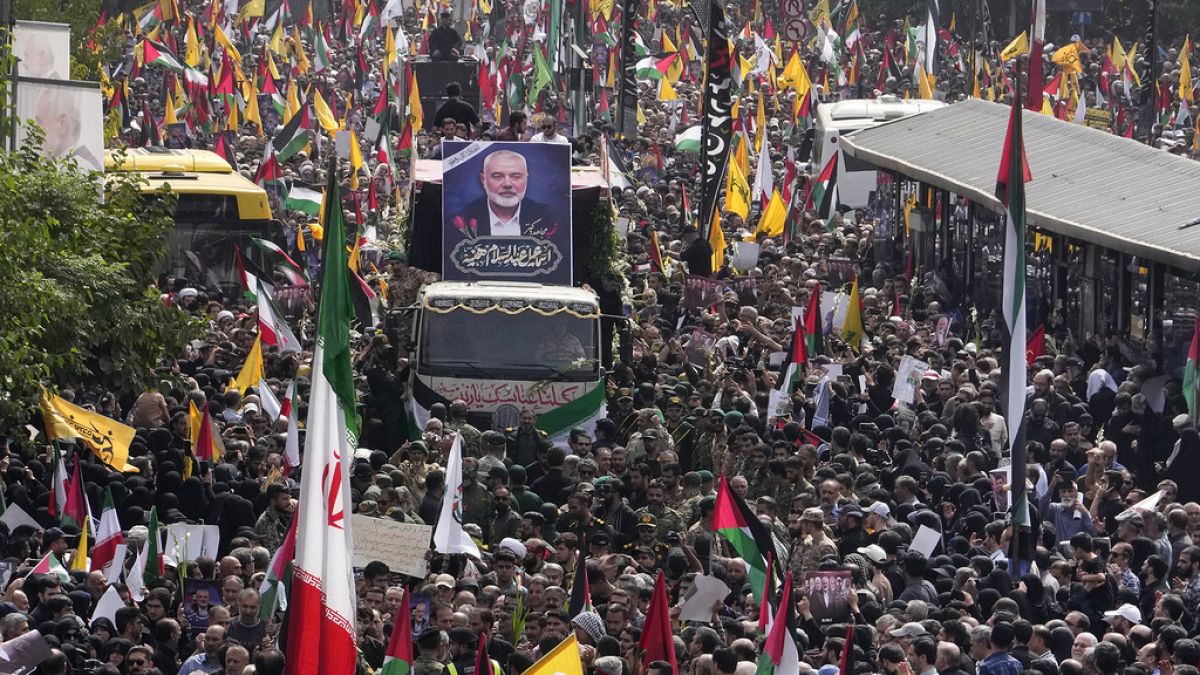Hamas leader Ismail Haniyeh and his bodyguard were killed in a shocking assassination blamed on Israel on Wednesday.
Iran’s supreme leader and representatives of Palestinian militias he backs prayed on Thursday over the coffins of Hamas leader Ismail Haniyeh and his bodyguard.
The pair were killed in an assassination blamed on Israel that increased the risk of escalating into an all-out regional war.
Ayatollah Ali Khamenei prayed over Haniyeh’s coffin at Tehran University while Iran’s new President Masoud Pezeshkian stood next to him. State television later showed the coffins placed in a truck and moved on the street toward Azadi Square in Tehran, where bystanders threw flowers onto them.
Haniyeh came to Tehran to attend the inauguration of Pezeshkian but, hours later, he was killed in an airstrike that hit a residence Haniyeh uses in Tehran. Iranian authorities said the attack is under investigation but haven’t yet provided further details.
Israel had pledged to kill Haniyeh and other Hamas leaders over the group’s 7 October attack on southern Israel that sparked the war in Gaza.
Iran supports Hamas, as well as Hezbollah and other Palestinian militant groups fighting Israel in Gaza.
In response to Haniyeh’s death US Secretary of State Antony Blinken said “all parties” in the Middle East must avoid escalatory actions that could plunge the region into further conflict.
Speaking in the Mongolian capital of Ulaanbaatar on Thursday, Blinken appealed for countries to “make the right choices in the days ahead” and said a cease-fire between Israel and Hamas in Gaza was the only way to begin to break the current cycle of violence and suffering. Blinken did not mention Israel, Iran or Hamas by name in his comments.
Tensions between Israel and Iran rose earlier this year when Israel hit Iran’s embassy in Damascus in April. Iran retaliated, and Israel countered in an unprecedented exchange of strikes on each other’s soil.
Pezeshkian’s spoke in support of Palestinians in his inauguration ceremony speech, saying “Iran demands a world where no Palestinian child’s dreams are buried under the rubble of their home”.
On Wednesday, Israeli Prime Minister Benjamin Netanyahu said that Israel “will exact a heavy price from any aggression against us on any front.”
It was his first public statement since the killing of Haniyeh, but his comments didn’t mention the killing.
In response, Stéphane Dujarric, Spokesman for the UN Secretary-General, delivered a statement on behalf of Antonio Guterres.
The UN said strikes in South Beirut and Tehran “represent a dangerous escalation at a moment in which all efforts should instead be leading to a ceasefire in Gaza, the release of all Israeli hostages, a massive increase of humanitarian aid for Palestinians in Gaza and a return to calm in Lebanon and across the Blue Line”.
“Rather than that, what we are seeing are efforts to undermine these goals,” it added.
In Italy, the Foreign Minister and deputy prime minister Antonio Tajani expressed his concerns regarding a possible escalation in the Middle East.
“We absolutely do not want the Middle East to plunge into open war,” he said.

